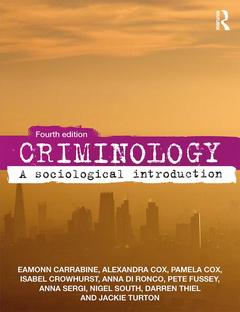Criminology (4th Ed.) A Sociological Introduction
Auteurs : Carrabine Eamon, Cox Pam, Crowhurst Isabel, Di Ronco Anna, Fussey Pete, Sergi Anna, South Nigel, Thiel Darren, Turton Jackie

Comprehensive, critical and accessible, Criminology: A Sociological Introduction offers an authoritative overview of the study of criminology, from early theoretical perspectives to pressing contemporary issues such as the globalisation of crime, crimes against the environment, terrorism and cybercrime.
Authored by an internationally renowned and experienced group of authors in the Department of Sociology at the University of Essex, this is a truly international criminology text that delves into areas that other texts may only reference. It includes substantive chapters on the following topics:
? Histories of crime;
? Theoretical approaches to crime and the issue of social change;
? Victims and victimisation;
? Crime, emotion and social psychology;
? Drugs, alcohol, health and crime;
? Criminal justice and the sociology of punishment;
? Green criminology;
? Crime and the media;
? Terrorism, state crime and human rights.
The new edition fuses global perspectives in criminology from the contexts of post-Brexit Britain and America in the age of Trump, and from the Global South. It contains new chapters on cybercrime; crimes of the powerful; organised crime; life-course approaches to understanding delinquency and desistance; and futures of crime, control and criminology.
Each chapter includes a series of critical thinking questions, suggestions for further study and a list of useful websites and resources. The book also contains a glossary of the criminological terms and concepts used in the book. It is the perfect text for students looking for a broad, critical and international introduction to criminology, and it is essential reading for those looking to expand their ?criminological imagination?.
Part 1: The Criminological Imagination, 1. Introduction, 2. Histories of Crime, 3. Researching Crime, Part 2: Thinking About Crime, 4. Enlightenment and Early Traditions, 5. Early Sociological Thinking about Crime, 6. Radicalizing Traditions: Marxism, feminism and Foucault, 7. Crime, Social Theory and Social Change, 8. Crime, Place and Space, 9. Victims and Victimization, Part 3: Doing Crime, 10. Life Course Criminology, 11. Theft, Fraud and Other Property Crimes, 12. Crime, Sexuality and Gender, 13. Crime, the Emotions and Social Psychology, 14. Organised Crime, 15. Corporate Crime and Crimes of the Powerful, 16. Drugs, Alcohol, Health and Crime, Part 4: Controlling Crime, 17. Thinking about Punishment, 18. The Criminal Justice Process, 19. The Police and Policing, 20. Prisons and Imprisonment, Part 5: Globalising Crime, 21. Green Criminology and Environmental Crime, 22. Crime and Media, 23. Digital Criminology and Cybercrime, 24. Political Violence, Terrorism and Counter-terrorism, 25.State Crime and War Crime, 25. Criminological Futures.
Date de parution : 04-2020
18.9x24.6 cm
Disponible chez l'éditeur (délai d'approvisionnement : 14 jours).
Prix indicatif 50,12 €
Ajouter au panierDate de parution : 04-2020
18.9x24.6 cm
Disponible chez l'éditeur (délai d'approvisionnement : 14 jours).
Prix indicatif 214,69 €
Ajouter au panierThème de Criminology :
Mots-clés :
Young Man; Introduction to Criminology; UK’s Police; Perspectives in Criminology; Human Suffering; Green Criminology; UK National Press; Understanding Deviance; Queer Criminologists; Classical Criminology; Taxi Dance Hall; Criminological Theory; Pittsburgh Girls Study; Global Crime; Social Disorganisation; UK Border Agency; Green Criminologists; Capital Punishment; Attention Deficit Hyperactivity Disorder; International Humanitarian Law; Criminological Imagination; Radicalising Traditions; Reintegrative Shaming; LGBTIQ People; Prison Reform Trust; Alien Conspiracy Theory; Hair Curly; UK Prison Population; Eta Member; UK Law Enforcement; Property Crime Offenders; Age Crime Curve
